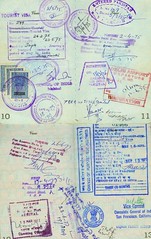 If you are a citizen from a country outside of the European Union, then you will need a passport to travel from the UK to other European countries. You may not be asked to produce your passport at every border crossing, even one out of the UK to another EU country, but it is advisable to carry it with you. At different borders, border personnel may ask to see your passport at any time. You will have to have your passport to get back over the border to your home country anyway, so carry it on your person if you are traveling from one European country to another. Once in an EU country you will be visiting for a bit, leave your passport in the hotel safe, so you don’t lose it in case of pickpocket or an accident.
If you are a citizen from a country outside of the European Union, then you will need a passport to travel from the UK to other European countries. You may not be asked to produce your passport at every border crossing, even one out of the UK to another EU country, but it is advisable to carry it with you. At different borders, border personnel may ask to see your passport at any time. You will have to have your passport to get back over the border to your home country anyway, so carry it on your person if you are traveling from one European country to another. Once in an EU country you will be visiting for a bit, leave your passport in the hotel safe, so you don’t lose it in case of pickpocket or an accident.
Initially, other requirements to travel first to the UK may include a visa. Consult your local consulate well before your travel date to make sure of all requirements. Other documentation that you may be asked for at border crossings, while traveling in Europe, include a letter of invitation, a round-trip or return ticket, proof of accommodations and an itinerary for your trip. Each country within the EU has different requirements for foreign visitors unless they are participating Member States of the Schengen agreement, which allows for persons of certain countries to travel freely within the Schengen area. Once in the Schengen area, if you are from one of the 35 countries with special privileges, in which the United States is included, you can go from one country to another freely without a visa, but will still need your passport. Be aware the UK is not a Member State, so they have their own requirements for border crossing.
Make sure well before your departure that you have applied for your passport, or if you already have one, check to make sure it hasn’t expired, and gotten all other documentation together including a visa if you need one. Another important matter to handle is purchasing your travel insurance. Travel insurance package plans provide various coverages such as: travel medical insurance, trip cancellation policies, as well as protection against lost baggage, trip delays and missed connections. Travel medical insurance is highly recommended in case you are injured during your trip to Europe. Traditional insurance policies do not cover travel to other countries and you will require coverage in case you need emergency transport, hospital care or medical evacuation back to your home country. This way you won’t be responsible to pay for the costs of these medical services yourself.
